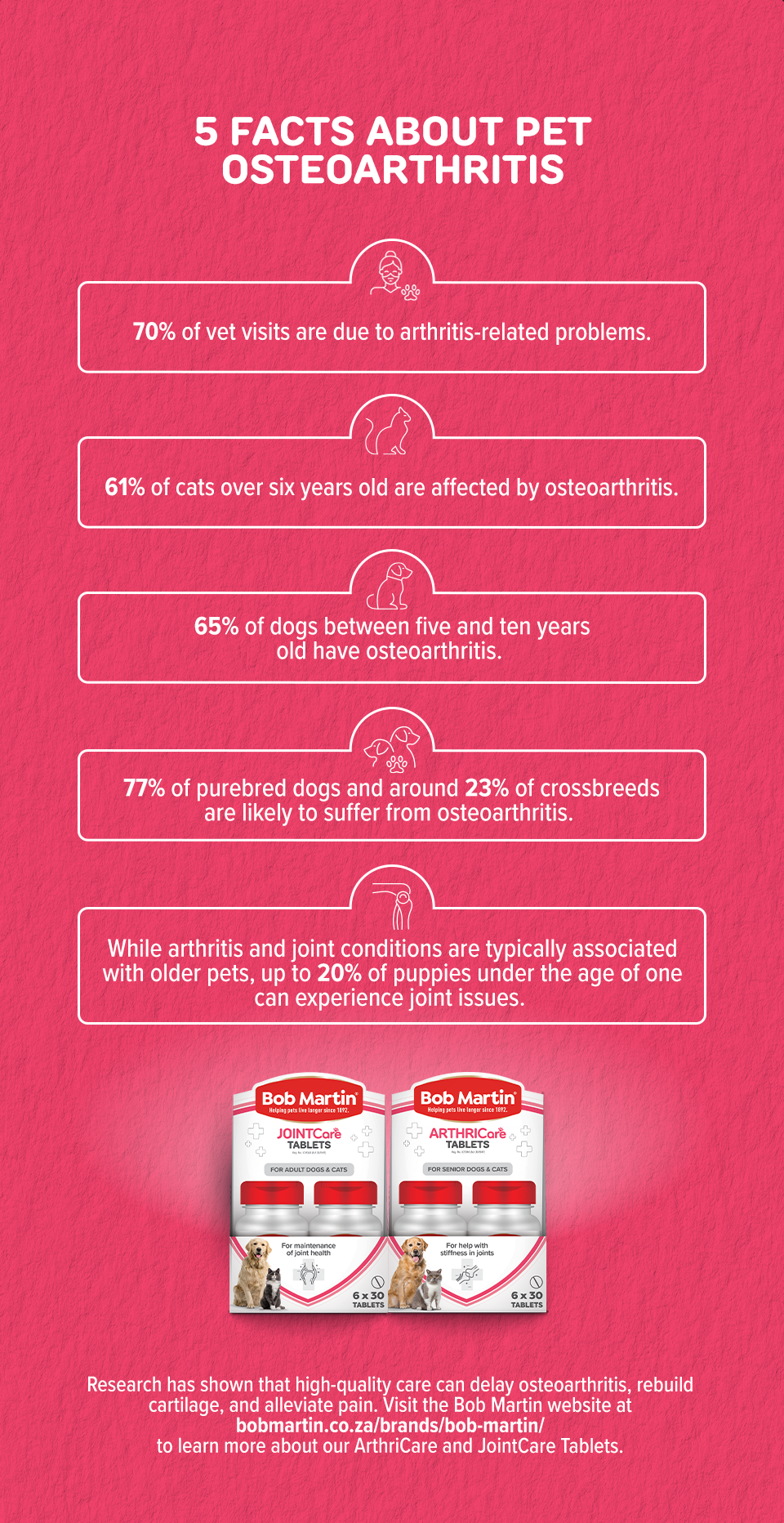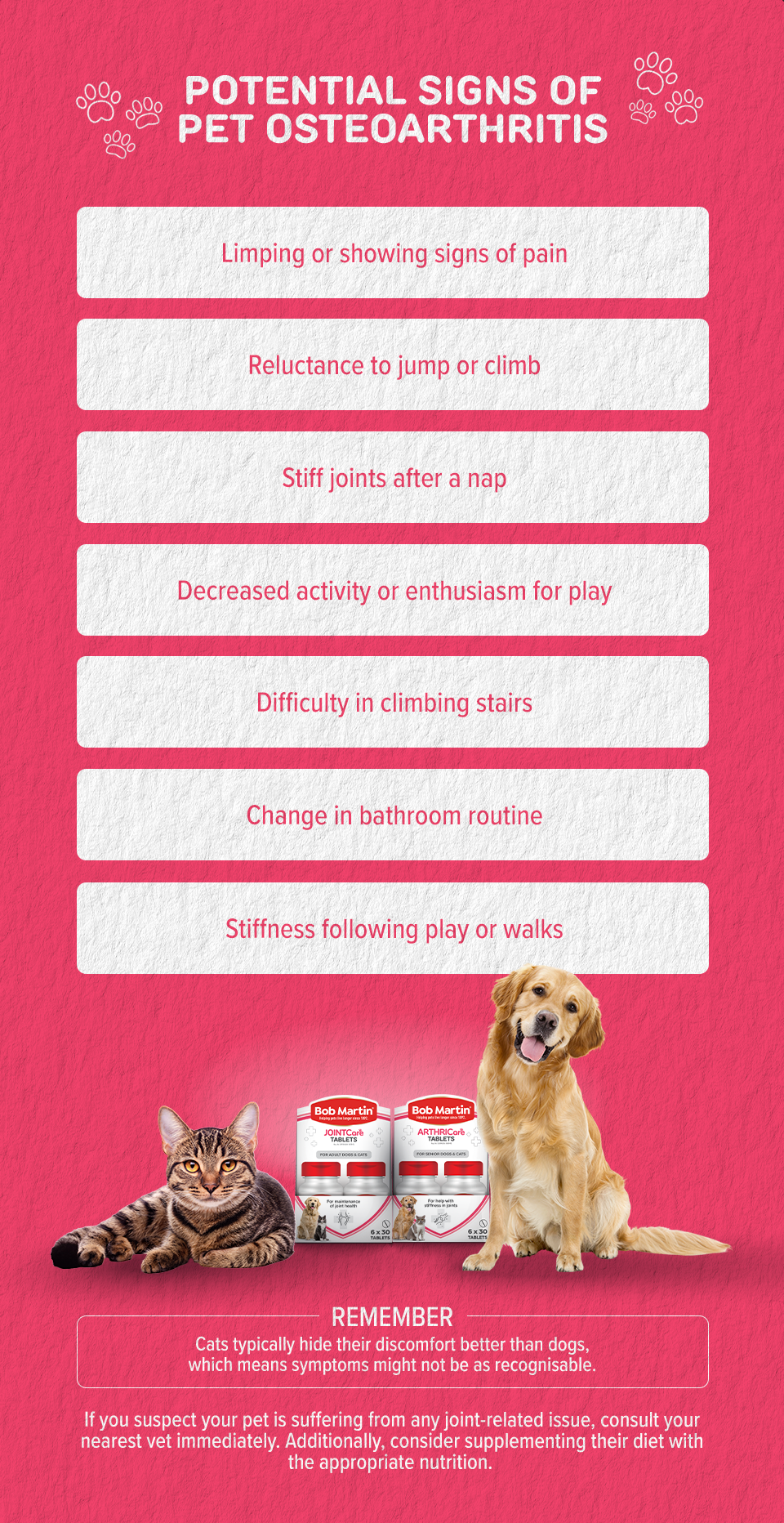Is your pet showing signs of Osteoarthritis?
Understanding and treating the condition
We never want our pets to experience any type of discomfort or pain, but the hard reality is that pets and humans can suffer from many of the same ailments. And, just like us, aches and pains can occur during any stage of life.
A common complaint to be aware of is arthritis; more particularly, osteoarthritis. Known as the ‘wear and tear’ arthritis, osteoarthritis occurs when flexible tissue at the ends of bones wears down, causing the bones to grind on each other and leading to immense pain. Cats can suffer from osteoarthritis in their elbow joints, hips, or cartilage disks, while dogs can experience the disease in the same regions as well as in their knees and wrist bones.

Pets at risk of osteoarthritis
Studies have shown that 61% of cats over the age of six and 65% of dogs aged between five and ten years have osteoarthritis. While arthritis and joint conditions are typically associated with older pets, as many as 20% of dogs under the age of one can experience joint issues. It’s important to note that 77% of purebred dogs are prone to contracting the condition, compared to around 23% of crossbreeds.
Pets come in all shapes and sizes. Heavier-set pets and those with bigger bone structures tend to put more strain on the flexible tissue at the end of bones. In time, this wears down. Breeds like Golden Retrievers, Rottweilers, and German Shepherds have a higher chance of getting osteoarthritis, compared to smaller breed dogs like Jack Russells or Cocker Spaniels who are lighter on their feet.
Pets can also develop osteoarthritis from trauma, joint operations, intense exercise during the early development phase (younger than 18 months), and games that require them to change directions quickly.
Behavioural signs of osteoarthritis in pets
To catch the condition before it’s too late, or prevent it from becoming a long-term problem, pet owners should pay close attention to a pet’s behaviour. See if they have difficulties standing up after taking a nap or are experiencing stiffness after playing for a short period. Perhaps they’ve completely lost their love of exploring, going for walks, or chasing noisy hadedas from the garden. Limping, decreased activity, and a change in their bathroom routine can also be signs of osteoarthritis.
While these are all behavioural changes to note, remember that cats typically hide their discomfort better than dogs, which means the symptoms might not always be easily recognisable.

How to treat osteoarthritis in pets
Chondroprotectors, like glucosamine sulfate, chondroitin sulfate, and collagen hydrolysate, are all basic components of the cartilage and synovial fluid, and can slow the progression of cartilage destruction, help regenerate the joint structure, reduce pain in the joint, and increase mobility by providing protection.
Bob Martin supplies a wide variety of nutritional aids for joint and arthritis care. Joint Care Tablets for Dogs and Cats help maintain joint health, whereas ArthriCare Tablets for Dogs and Cats help with stiffness in joints. However, before embarking on any new medication journey, it’s crucial to seek the advice of a veterinary professional and determine the diagnosis for your pet’s condition.
Alternatively, support your pet’s immunity every day with Bob Martin’s MultiCare Conditioning Tablets. Help your best friend live a fit, healthy life with essential vitamins and minerals. These tablets may help to prevent disorders such as a loss of appetite, lethargy, susceptibility to disease, excessive scratching, and many skin disorders.
Identify the signs of osteoarthritis early on to get your pet the help they need to live a happy, healthy, pain-free life.








